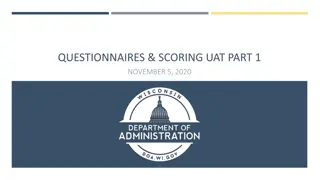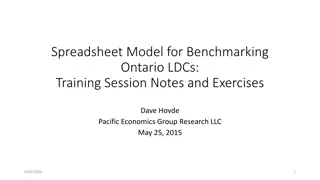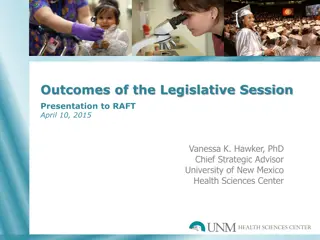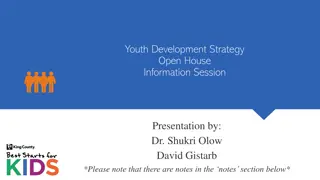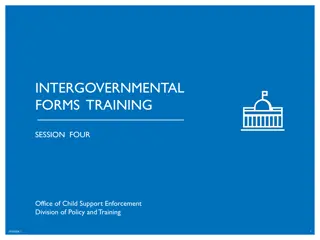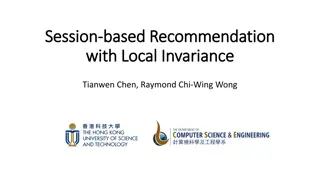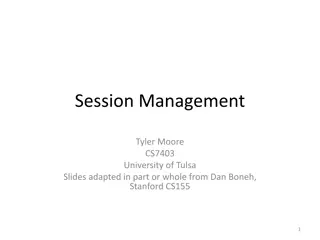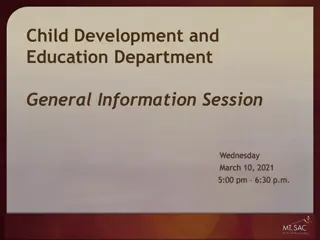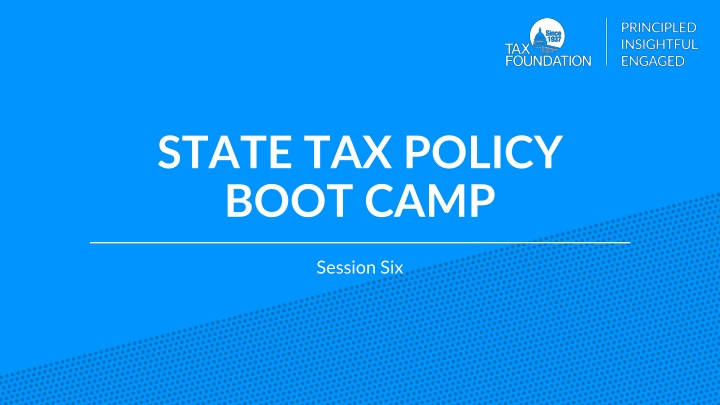
State Tax Policy Boot Camp: Strategies for Economic Recovery
Explore key insights on state tax revenues, policies, and federal interactions for economic recovery, including ARPA implications, tax cuts, conformity options, and modernization for the new economy.
Download Presentation

Please find below an Image/Link to download the presentation.
The content on the website is provided AS IS for your information and personal use only. It may not be sold, licensed, or shared on other websites without obtaining consent from the author. If you encounter any issues during the download, it is possible that the publisher has removed the file from their server.
You are allowed to download the files provided on this website for personal or commercial use, subject to the condition that they are used lawfully. All files are the property of their respective owners.
The content on the website is provided AS IS for your information and personal use only. It may not be sold, licensed, or shared on other websites without obtaining consent from the author.
E N D
Presentation Transcript
STATE TAX POLICY BOOT CAMP Session Six
STATE TAX REVENUES OVERVIEW AND FEDERAL INTERACTIONS State and local combined tax revenue up 1% in 2020 State revenue: down 1% (-$11 billion) Local revenue: up 4% (+$29 billion) S+L combined revenue: up 1% (+$18 billion) American Rescue Plan Act fiscal relief: $350 billion Sources of tax revenue stability Federal Reserve intervention to stabilize stock markets (capital gains grew) PPP loans (saved jobs and businesses) Enhanced and expanded UC benefits (taxable in some states, though with new exclusions) Other aid to individuals and businesses, including checks to taxpayers @TaxFoundation TAX FOUNDATION
STATE TAX AUTHORITY ARPA S TAX CUT LIMITATION Provision is vague but potentially implicates a wide range of tax decisions not just rate reductions, but conformity, excluding UC from taxation, adjusting deductions, etc. Raises constitutional questions if broadly interpreted Conditions on states must be unambiguous and not unduly coercive (see Pennhurst, SD v. Dole, NFIB v. Sebelius) Four questions for Treasury What constitutes a net tax reduction? How is a reduction determined to result from a policy change? Which expenditures create fiscal capacity for a net tax cut? How would offsetting a tax reduction be defined? @TaxFoundation TAX FOUNDATION
POLICIES FOR RECOVERY OVERVIEW 1) Conform to federal pandemic-related tax relief provisions, especially those designed to enhance liquidity 2) Modernize tax rules to better accommodate telework and the new economy 3) Stop state taxation of Global Intangible Low-Taxed Income (GILTI) 4) Repeal burdensome taxes businesses must pay regardless of profitability 5) Fix unemployment insurance (UI) tax systems to prevent tax hikes @TaxFoundation TAX FOUNDATION
POLICIES FOR RECOVERY CARES & ARPA CONFORMITY OPTIONS Exclude PPP loans from taxable income Expand NOL provisions Enhance treatment of business interest Exempt $10,200 of UC from taxation @TaxFoundation TAX FOUNDATION
POLICIES FOR RECOVERY TAX MODERNIZATION FOR THE NEW ECONOMY Adopt mobile workforce thresholds Limit nexus for companies whose only physical connection to the state is remote workers At federal level, modernize P.L. 86-272 or consider something like the Business Activity Tax Simplification Act Source: Mobile Workforce Coalition @TaxFoundation TAX FOUNDATION
POLICIES FOR RECOVERY EXCLUDE GILTI FROM TAXATION GILTI intended as a federal guardrail in shift to quasi-territorial taxation and does not make much sense in a state context Lack of federal provisions (like credit for foreign taxes paid) leads to excess taxation Taxing GILTI is complex and makes a state less attractive for investment by multinational firms @TaxFoundation TAX FOUNDATION
POLICIES FOR RECOVERY REPLACE TAXES ON UNPROFITABLE BUSINESSES @TaxFoundation TAX FOUNDATION
POLICIES FOR RECOVERY FIX UI TAX SYSTEMS Many states have acted to prevent automatic adoption of higher tax rate schedules and to prevent employer experience ratings from being impacted by pandemic-related layoffs @TaxFoundation TAX FOUNDATION
POLICIES FOR RECOVERY REVENUE OPTIONS States looking to generate additional revenue should consider less economically harmful options Modernize sales tax bases to additional consumer goods and services while keeping business inputs exempt to prevent tax pyramiding Reduce reliance on targeted business economic development incentives These incentives mostly subsidize economic activities that would have occurred anyway This revenue would be better spent making the underlying tax code more structurally competitive for all current and prospective businesses and individuals @TaxFoundation TAX FOUNDATION
THANK YOU! CONNECT WITH US All Boot Camp sessions available at www.taxfoundation.org/bootcamp Join our regular email list at https://taxfoundation.org/tax-newsletter/ Connect with us on Twitter @taxfoundation Questions? Contact Jared Walczak at jmw@taxfoundation.org or by Twitter DM @jaredwalczak @TaxFoundation TAX FOUNDATION


